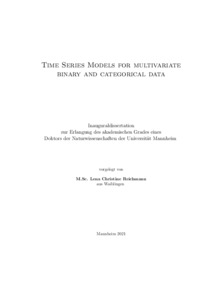|
Time series models for multivariate binary and categorical data
Reichmann, Lena
![[img]](https://madoc.bib.uni-mannheim.de/59896/1.hassmallThumbnailVersion/Dissertation_LenaReichmann.pdf)  Vorschau |
|
PDF
Dissertation_LenaReichmann.pdf
- Veröffentlichte Version
Download (5MB)
|
|
URL:
|
https://madoc.bib.uni-mannheim.de/59896
|
|
URN:
|
urn:nbn:de:bsz:180-madoc-598962
|
|
Dokumenttyp:
|
Dissertation
|
|
Erscheinungsjahr:
|
2021
|
|
Ort der Veröffentlichung:
|
Mannheim
|
|
Hochschule:
|
Universität Mannheim
|
|
Gutachter:
|
Jentsch, Carsten
|
|
Datum der mündl. Prüfung:
|
7 Juni 2021
|
|
Sprache der Veröffentlichung:
|
Englisch
|
|
Einrichtung:
|
Fakultät für Wirtschaftsinformatik und Wirtschaftsmathematik > Sonstige - Fakultät für Wirtschaftsinformatik und Wirtschaftsmathematik
|
|
Fachgebiet:
|
310 Statistik
510 Mathematik
|
|
Freie Schlagwörter (Englisch):
|
time series analysis , binary data , categorical data , autoregressive-moving average , autocovariance structure , stationarity , Yule-Walker-equations , mixing
|
|
Abstract:
|
In the following thesis, we investigate the modeling of time series data with multivariate discrete and especially binary structure. A model for categorical time series data with a nice interpretability which, in addition, is parsimonious, is the New Discrete AutoRe- gressive Moving Average (NDARMA) model of Jacobs and Lewis (1983). However, this model only can capture positive autocorrelation as well as positive parameters.
In the first part of the thesis, we propose an extension of the NDARMA model class for the special case of binary data, that allows for negative model parameters, and, hence, autocorrelations leading to the considerably larger and more flexible model class of generalized binary ARMA (gbARMA) processes. For this class of processes, we infer statistical properties and compare it in a simulation study with the benchmark model, the Markov Processes and other time series models.
In the second part, we adopt the approach of the first part and propose a vector- valued extension of gbAR processes, that enable the joint modeling of serial and cross- sectional dependence of multivariate binary data. The resulting class of generalized binary vector Auto-Regressive (gbVAR) models is parsimonious, nicely interpretable and allows also to model negative dependence. We further extend the gbVAR model to include a moving average part, resulting in turn in the gbVARMA model.
In the third and final part we pursue a further extension to vector-valued categorical time series data. For the proposed gbVARMA and NDVARMA models, we provide stationarity conditions and state the stationary solution. Stochastic properties, e.g. Yule-Walker- type equations and classical Yule-Walker equations for the pure autore- gressive case are derived. We show φ- and ψ- mixing properties of the gbVAR and NDVARMA model by proving the strict positivity of the transition probabilities. For the NDVARMA model, we discuss the identification of the distribution of the vector- valued innovation process. In simulation studies the performance of the estimators is illustrated.
All three model classes are applied to real data examples.
|
 | Dieser Eintrag ist Teil der Universitätsbibliographie. |
 | Das Dokument wird vom Publikationsserver der Universitätsbibliothek Mannheim bereitgestellt. |
 Suche Autoren in Suche Autoren in
Sie haben einen Fehler gefunden? Teilen Sie uns Ihren Korrekturwunsch bitte hier mit: E-Mail
Actions (login required)
 |
Eintrag anzeigen |
|
|
